How to win in China: Top brands share tips for success
- Published
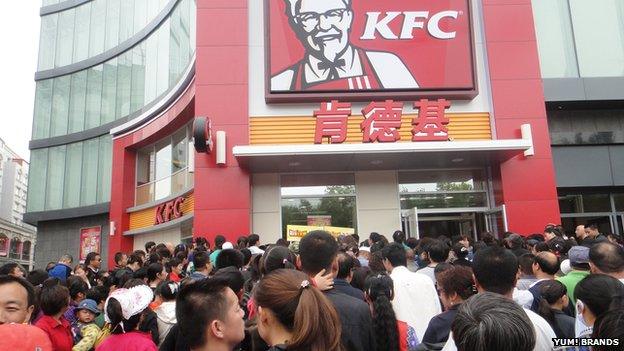
KFC opens one of its thousands of restaurants in China
The masses of new middle-class consumers in China are one of the big targets for global companies battling the sluggish economies of Europe and North America.
But which companies have managed to stand out in this important market?
The BBC asked global brand research company Millward Brown to find the 20 most powerful foreign brands in China, the ones that have gone in and succeeded where many others have failed.
We then asked those companies to tell us the secrets of their success.
The top 20 brands
Between 2011 and 2013, Millward Brown carried out almost 60,000 face-to-face and online interviews with consumers in 10 Chinese cities as part of their market research in the country.
The company then analysed its findings for the BBC, ranking brands on how "meaningful", "different" or "salient" they were and how easily they came into consumers' minds.
Thirteen of the top 20 brands are from the US, two from Germany, two from France, one from Italy and one from the Anglo-Dutch conglomerate Unilever. South Korea's Samsung is the only Asian brand on the list.
The opportunity is there for the taking. Millward Brown has found that Chinese consumers once valued low prices above any other factor when making choices. But a mix of higher living standards and falling trust in local brands means people are looking to international brands more.
"Our research shows that in the last three years, trust in Chinese brands has eroded quite dramatically," says Millward Brown's Peter Walshe.

Big global brands are getting a boost from China's growing middle class
"This is an opportunity for well-known and well-supported international brands to make their move as consumers start to value quality and experience as much as price."
So how do you create a brand that works in China? We asked the companies on our list and 11 of them; Coca-Cola, McDonald's, Nike, L'Oreal, Apple, Samsung, Adidas, Armani, Omo, VW and the number one brand KFC gave us the lowdown on how it's done.
Get in early
All of the brands have been pioneers in China, entering before 2000.
Coca-Cola has been there since 1927 and by 1948 was shifting more than a million bottles a year in Shanghai, making it the biggest city for the company outside the US.
Nike says it's been there since 1981, VW started in 1983, KFC in 1987 and McDonald's followed in 1990, so getting in early seems to be a key factor.
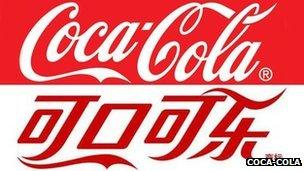
Coca-Cola first entered China in 1927
Understand your market
The Chinese market is changing quickly and many of the companies are learning to keep up.
"Everyone is learning about how they need to work with changing social attitudes and continuous aspirational trade-ups, even the Chinese themselves." according to McDonald's.
"Never assume what works for your mature markets will work for China. Success comes for those who stay relevant to the needs of the Chinese consumer."
Other brands, such as Unilever's detergent Omo, go in with a fully researched understanding of the behaviours of consumers.

Adidas opened 800 stores in China last year
It found that in many markets a family would use three buckets to wash clothes but Chinese consumers used five buckets for their laundry and Omo pitched their brand accordingly.
Nike is developing products around Chinese habits and sports, which it then plans to sell in other markets.
Giorgio Armani says that when he went into China, he painted the door of the store in Beijing red as he thought it would appeal more to his customers. Now Armani says he doesn't really change his offering in China from other markets as the customers want the Western style he sells internationally.
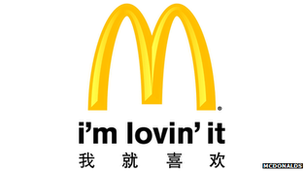
McDonald's says brands must keep changing to stay relevant to the Chinese consumer
Be bold
Having got in early, many of the companies are building on that advantage. Some of the numbers are staggering.
KFC has 4,400 restaurants in 850 cities and will add another 700 this year.
McDonald's says it is opening 10 restaurants a week and during 2012-15 Coca-Cola will invest $4bn expanding in China.
But it's not all fast food and fizzy drinks. Apple is doubling the number of stores in China in the next two years.
For German carmaker Volkswagen, China is its biggest market, representing a third of its global business and it has seven new production plants in the pipeline.
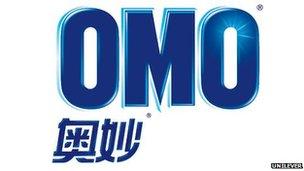
The Chinese use five buckets to rinse a wash, according to detergent brand Omo
City strategy
Many of the brands that spoke to us stressed the importance of looking beyond the coastal cities of Shanghai and Beijing to the staggering growth and new consumers in cities across the country.
Both Samsung and L'Oreal tailor their approach in China to different regions.
Adidas says of the 800 stores it opened in China last year, half of them were in these so-called "lower-tier" cities.
It has found very different attitudes in the north and the south of the country but says even in inland cities, consumers are increasingly looking to buy aspirational foreign brands.
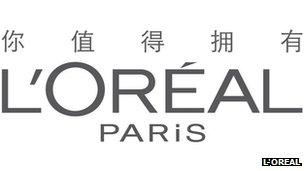
L'Oreal is one of the companies that tailors its approach to China's different regions
Build your team
Running a business in China is difficult to do from outside the country, and many of these multinationals tell us that their success is built on finding the best Chinese talent and joint venture partners.
KFC, L'Oreal, VW and Adidas all say that hiring and then training the best local talent helps them understand their customers better.